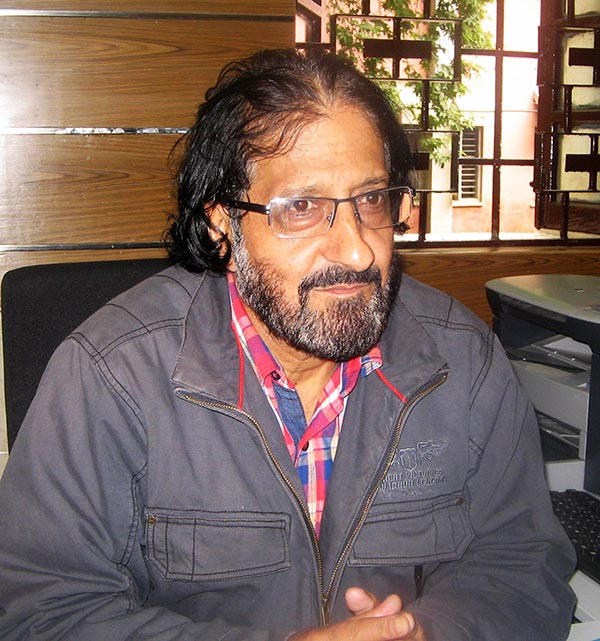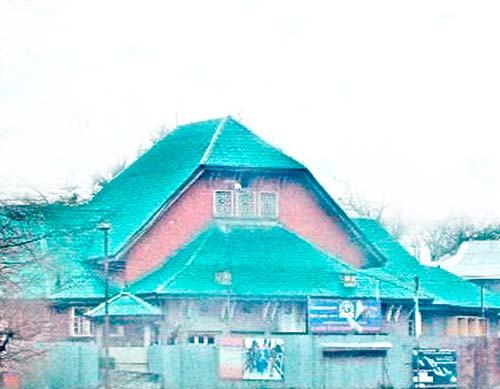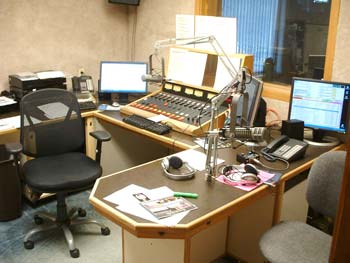In a period spanning over half a century, Radio Kashmir became an inseparable part of Kashmir’s modern history and culture. While the station gradually lost its sheen with the emergence of an overwhelming situation in Kashmir valley, the management of All India Radio, Srinagar has finally began to digitize its rich archives, Bilal Handoo reports.
In the Tapes and Recording section of Radio Kashmir in Srinagar city, archival voice recordings are being digitized. The room where the process of digitization is going on has a classy look with a gramophone sitting on a corner shelf airing soft music of bygone eras. The three men inside the room are busy in searching, selecting and digitizing the tapes.
Among the scores of archival radio recordings, the room has some unforgettable collections like Poshkar Bhan’s Machama, Ali Muhammad Lone’s Veth Rouz Pakan and Som Nath Sadhu’s Vach Kis Patchastal. Besides, stalwarts like Ustad Mohammad Abdullah Tibet Bakal, Ustad Ghulam Mohammad Qaleenbaft, Ghulam Qadir Langoo, Raj Begum, Naseem Akhtar, Nasrullah Khan and others are all present in the form of their voice recordings in the room.
Nisar Ahmad Bala, the in-charge of library tapes section of Radio Kashmir says the process of digitization is a step to keep ‘rich archives’ safe and secure for present and future generations. “We are just responding to demands of times,” Bala, while playing old records in gramophone, says. “You see, one has to keep the medium relevant by adapting to the norms of new times.”
But there are some people within the station who claim that the digitization is not merely driven by the sense of market demand. Insiders in Radio Kashmir say most of archival recordings were lying in dilapidated condition which triggered a sense of desperation among the officials to restore them. “Most of the archival stock of the station is already lost,” an official told Kashmir Life on the condition of anonymity. “Now, as the officials woke up from slumber, the main thrust is on securing the remaining archives.”
Fame Zoona-Dub!

Radio Kashmir is one of the few organizations which have worked relentlessly to save the Kashmiri language and culture. The station became popular when Pushkar Bhans’s Zoona-Dub was aired for more than nineteen years at a time when radio was a popular medium of entertainment for people.
The much celebrated radio feature Zoona-Dub narrated the story of a typical Kashmiri family. It was the first diet of radio listeners and it is said that without listening to the program, people felt incomplete throughout the day. The characters in the feature reflected the true values and ethos of Kashmiri culture.
But, is Zoona-Dub all preserved?
“Look we have been able to digitalize greater portion of the feature, except its live recordings which were not recorded then,” Nisar Bala says.
Zoona-Dub feature was started in 1966. It reflected the daily problems faced by the people in Kashmir valley who instantly identified themselves with the characters of the feature. Late Som Nath Sadhu put his heart into the program and worked very hard by playing its central character, Aga Saab.
The present day broadcasters in Radio Kashmir say Sadhu knew well if Zoona-Dub had to be the people’s program, then he had to be among the people to know their grievances. He would go and stand near the pavements of shops, visit ration ghats to record the impressions of the people about rations supplied to them, and also the feelings of boat-women. He would sit among ladies to hear their grievances.
Sadhu was awarded ‘Padama Shri’ for Zoona-Dub in 1974 which was broadcast uninterrupted till his death in 1982. It continued for a few more years after his death. But the feature lost its sheen after his death.
Bashir Aarif, Deputy Director General, Radio Kashmir, who is also a noted poet and broadcaster, says Zoona-Dub was rebroadcast from April this year. “On public demand and keeping the popularity of the program in view, we have digitalized almost major chunk of the stock available to us,” he informed.
Arrival of Radio
The story about the creation of Radio Kashmir is an interesting one. After the raid launched by Pakistani tribals in October, 1947, the then Maharaja Hari Singh set up two radio stations, the first at Jammu on December 1, 1947 and the second at Srinagar.
Ghulam Mohi-ud-Din was the first head of Radio Kashmir station. “Strategically, Radio Kashmir occupied a very important place in Indian broadcasting set up. The programs were devised keeping in view the culture, language and values of the society,” Bashir Aarif said.
It was during this time that Prem Nath Pardesi, an all-time great artist of the state, earned death warrant from Pakistanis for using radio as a medium to counter their programs during the tribal raid. Pardesi had scripted the slogan Hamlavar Khabardar, Hum Kashmiri Hai Tayar. This became the slogan of resistance put up by Kashmiris to defend Srinagar city against Pakistan’s tribal invaders.
After 1953, Kashmir’s political landscape began to change. Within a few years of its inception, Radio Kashmir Srinagar came under the control of All India Radio and the format of the programs was changed to counter the Radio Azad Kashmir. Both these stations were used to counter programs aired by them. When Radio Azad Kashmir used to air Zarb e Qaleem, it was countered by Srinagar station’s Jawabi Hamla.
“Radio Kashmir was voice of the people despite being controlled by the government and it never ever let them down as far as entertainment, education and information was concerned,” Mohammad Sultan, an elder in Srinagar’s Sonwar area, says.
A Wave of Turbulence

When the armed struggle broke out in J&K, Radio Kashmir too had its share of woes. Most of the staff migrated out of valley and with the result, a vacuum was created. There was an abrupt shortage of engineers, programmers and even administrative staff. After the assassination of Lassa Koul, the then station head, Radio Kashmir was entrusted to one of senior most broadcasters and a programmer, Farooq Nazki.
During these days, the officials and newscasters of the station received life threats which forced the administration to air the news from New Delhi for Radio Kashmir. The announcement would be: ‘Ye Radio Kashmir Hai, Ab Aap Nayi Dilli Se Khabrein Sunye’!
“Abnormal situation forced most of the intellectuals, script writers and artists to boycott the radio. It was in this period that the government of India wanted that somehow the station should continue its broadcast,” an official inside Radio Kashmir said.
However, there was some revival in Radio Kashmir when late Ashraf Sahil took over as the director of the station. It was under his tenure that the daily current affair program Shaherbeen was started. The program stood the test of times and it is the only success story as far as reaching the masses was concerned.
“Sheharbeen is a news program broadcast by Radio Kashmir Srinagar that has grass root reach and caters to the problems of common people,” Nayeem Bhat, a radio listener says.
Today, many inside Radio Kashmir believe that the station is ailing again. “There is not only insufficiency of programmers but professionalism and broadcasting ethics have also been thrown to wind,” an official in Radio Kashmir says. He ascribed the afflicted state to the merger of script writers, production assistants and translators into transmission executive cadre.
With an important backup missing, no specialist cadre is left in Radio Kashmir. “Most of the programs are repeat broadcasts and this has resulted in dwindling listenership of radio Kashmir programs,” Mushtaq Shawl, 29, an ardent radio listener from Srinagar, says.
Syed Humayun Kaisar, Program head of Radio Kashmir, whose program Dhadkan (started in 2002) became a huge hit among the radio listeners, says: “Whatever is gone from our hands is golden, whatever we have is not gold!”

















